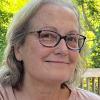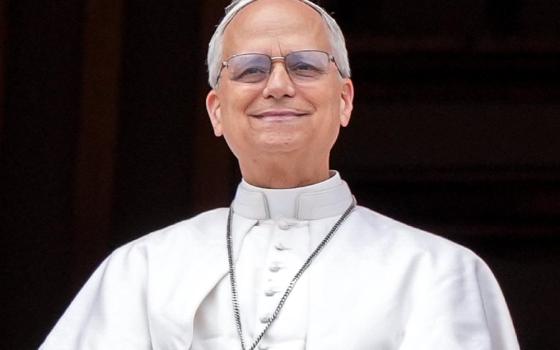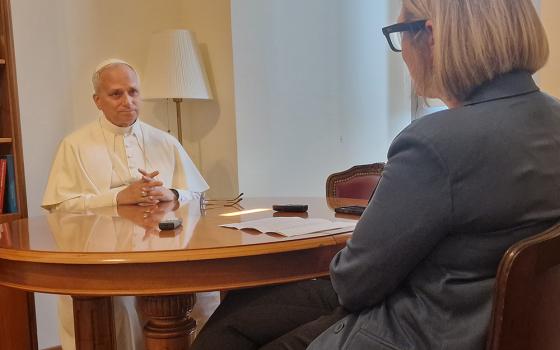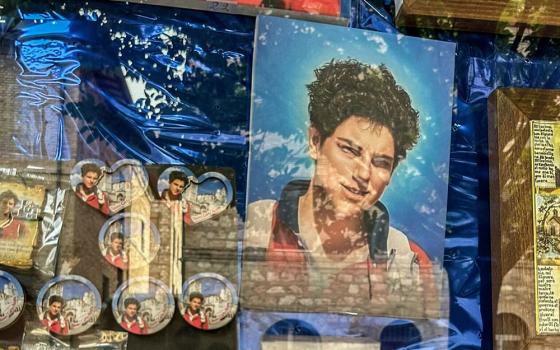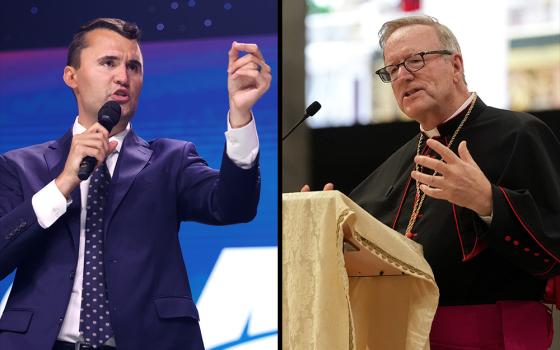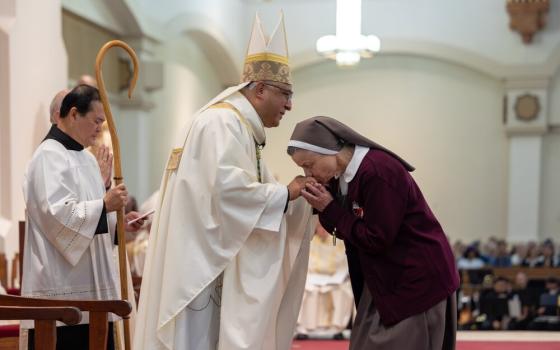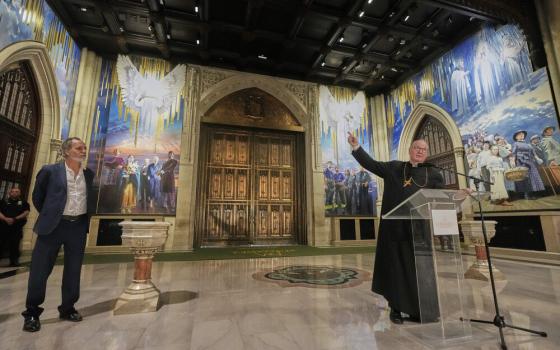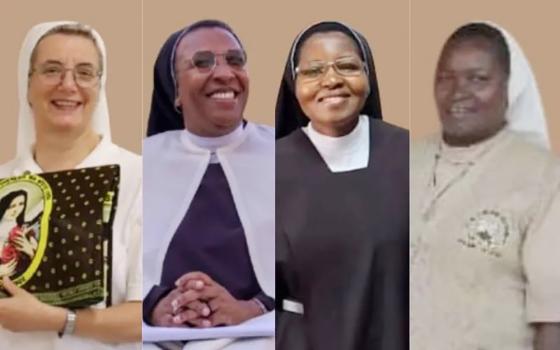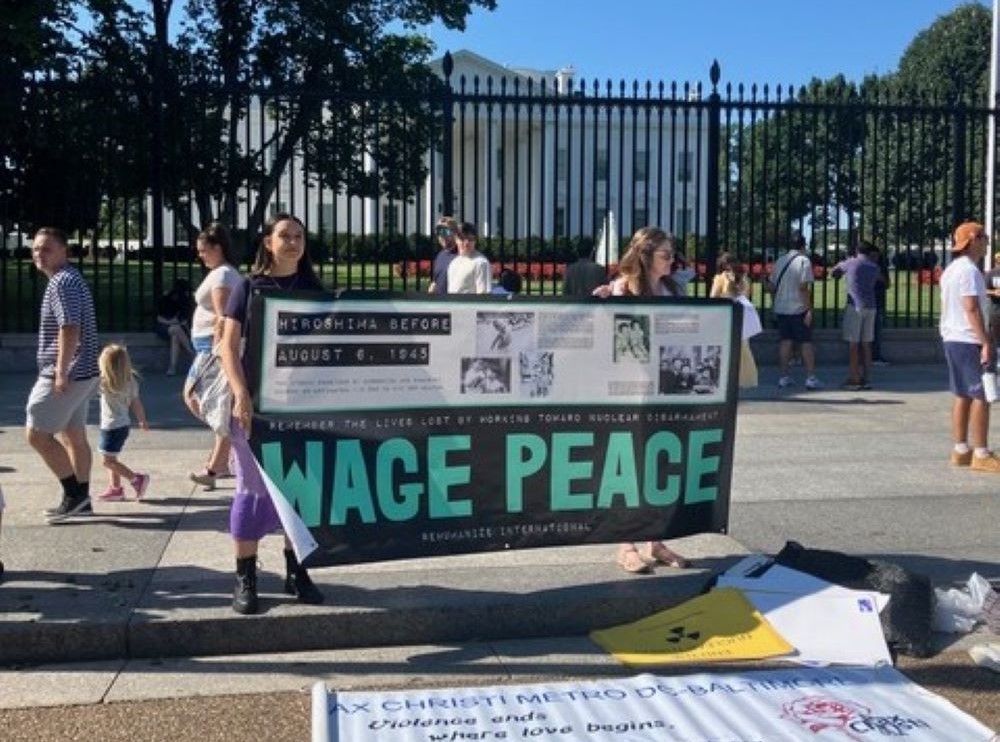
Participants in an Aug. 9 vigil at the White House hold signs decrying war. The event marked the 80th anniversary of the U.S. atomic bombing of Nagasaki, Japan. (Patricia Zapor)
On the 80th anniversary of the U.S. atomic bombing of Nagasaki, Japan, peace activists representing faith-based and secular organizations gathered outside the White House Aug. 9 to pray and raise public awareness about nuclear weapons.
"This week Pope Leo said, 'Nuclear arms offend our shared humanity and … betray the dignity of creation, whose harmony we are called to safeguard,' " said Marie Dennis, director of Pax Christi International's Catholic Nonviolence Initiative.
She said the nuclear bombs dropped on Hiroshima and Nagasaki on Aug. 6 and 9, 1945, respectively, stand as "symbols of memory" that urge us to reject the illusion of security founded on mutually assured destruction. Instead, we must forge a global ethic rooted in justice, fraternity and the common good," she continued, quoting Leo.
On a warm, sunny Washington day, the sidewalk in front of the White House was packed with tourists posing for selfies.
A few feet away, on one side of Pennsylvania Avenue, (permanently closed to traffic) about 50 people formed a semicircle to pray and hear speakers address ongoing efforts to eliminate the threat of nuclear war.
Participants carried banners and posters, while several dozen graphic photos arrayed in the street showed people killed or injured and buildings destroyed by the atomic bombs. Nearby, vendors hawked ice cream, drinks and Trump-themed souvenirs, while competing loudspeakers briefly belted out hip-hop music and, half a block away, teams played street hockey.
Passersby who paused to take in the vigil were handed fliers with information about the effort and invited to place a flower on one of the photos.
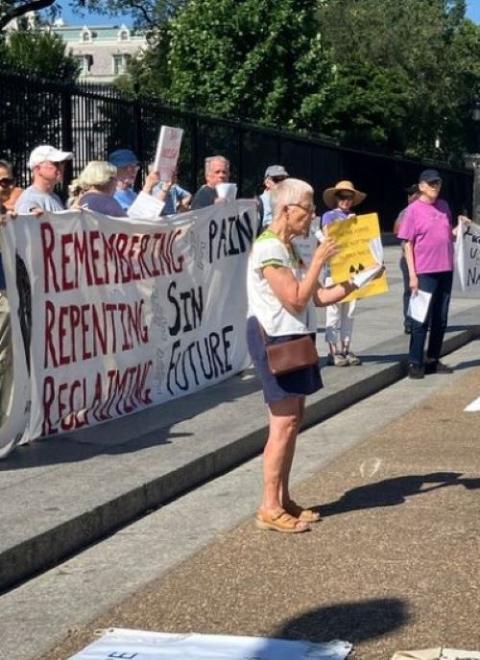
Marie Dennis, director of Pax Christi International’s Catholic Nonviolence Initiative, addresses a vigil outside the White House Aug. 9. (Patricia Zapor)
"We are here to remember and mourn" the victims in Hiroshima and Nagasaki as well as victims of testing nuclear weapons in the last 80 years and those who face an ongoing threat from the proliferation of nuclear bombs, said event co-organizer John Whitehead as he opened the program. He said there are 12,000 nuclear weapons in the world today.
Dennis noted that several U.S. archbishops were in Japan Aug. 5-10 to mark the 80th anniversary as part of a Pilgrimage of Peace organized with the archbishop of Nagasaki and the bishop of Hiroshima. Along with Cardinals Robert McElroy of Washington, Blase Cupich of Chicago, Archbishops Paul Etienne of Seattle and John Wester of Santa Fe; students, faculty and staff from Japanese Catholic universities, and U.S. Catholic universities: Georgetown, Loyola Chicago and Notre Dame participated in the pilgrimage.
'There is no moral justification for the possession of nuclear weapons.'
—Marie Dennis
Pope Francis definitively condemned the "very possession" of nuclear weapons, Dennis said. "There is no moral justification for the possession of nuclear weapons. That remains the current position of the Catholic Church worldwide."
In a talk given in Japan earlier in the week, Dennis said McElroy also referenced Francis's "decisive turn away from just war theory."
"Pope Francis … utilized the trajectory of all of these statements to construct a framework for Catholic teaching on war and peace that placed nonviolence rather than the just war ethic as the primary prism through which to evaluate decisions in situations of deep conflict," Dennis said, quoting McElroy.
She called on church leaders to work more assertively to eliminate nuclear weapons.
"Since the dawn of the nuclear age 80 years ago, the Catholic Church has been leaning toward a global ethic capable of dealing with the human capacity for utter destruction of life as we know it on our planet," Dennis said.
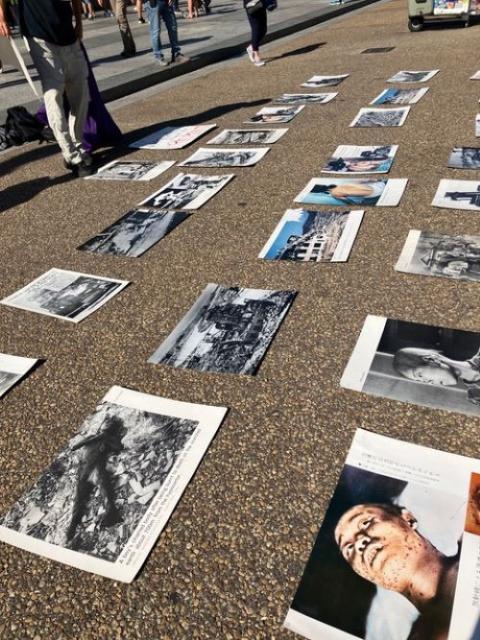
Some people placed roses on photos of victims of the 1945 U.S. atomic bombs. (Patricia Zapor)
"It is time to replace the logic of violence in which we are mired with a new logic of nonviolence," Dennis said. She quoted the late Jesuit theologian and peace activist Fr. Richard McSorley, who wrote: "The taproot of violence in our society is our intention to use nuclear weapons. Once we have agreed to that, all other evil is minor in comparison."
The vigil at the White House also included the reading of excerpts of testimony of Setsuko Thurlow, a survivor of the 1945 bombings, the recitation of a prayer for nuclear disarmament and information about an apology petition to the people of Japan.
On Aug. 6, several dozen people joined a similar prayer service and commemoration at the Pentagon. Both events included participation from the Dorothy Day Catholic Worker, Pax Christi USA, Pax Christi Metro DC-Baltimore, the Maryknoll Office for Global Concerns, Little Friends for Peace the Isaiah Project, the Assisi Community, Norfolk Catholic Worker and the Hampton Roads Campaign to Abolish Nuclear Weapons.
Advertisement
